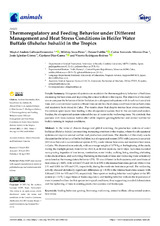Thermoregulatory and Feeding Behavior under Different Management and Heat Stress Conditions in Heifer Water Buffalo (Bubalus bubalis) in the Tropics
Autor
Galloso-Hernández, Maykel Andrés
Soca-Pérez, Mildrey
Dublin, Devon
Álvarez-Díaz, Carlos Armando
Iglesias-Gómez, Jesús
Díaz Gaona, Cipriano
Rodríguez-Estévez, V.
Editor
MDPIFecha
2021Materia
Feeding behaviorGrazing
Browsing
Wallowing
Animal welfare
Silvopastoral system
Heat stress
METS:
Mostrar el registro METSPREMIS:
Mostrar el registro PREMISMetadatos
Mostrar el registro completo del ítemResumen
In the wake of climate change and global warming, the production systems of water buffaloes (Bubalus bubalis) are receiving increasing attention in the tropics, where the silvopastoral systems can improve animal welfare and production conditions. The objective of this study was to characterize the behavior of heifer buffaloes in a silvopastoral system (SPS) with Leucaena leucocephala (600 trees/ha) and in a conventional system (CVS), under intense heat stress and moderate heat stress in Cuba. We observed nine animals, with an average weight of 167.9 kg at the beginning of the study, during the daylight period, from 6:00 to 18:00 h, at 10 min intervals, for 12 days. Activities recorded were grazing, ingestion of tree leaves, rumination, water intake, walking, lying, standing, sheltering in the shade of trees, and wallowing. Sheltering in the shade of trees and wallowing were collectively considered as thermoregulatory behavior (TB). TB was different in both systems and conditions of heat stress (p < 0.05), with 4.06 in CVS and 3.81 h in SPS in the intense heat stress period, while it was 2.91 and 1.08 h for SPS and CVS, respectively, during the moderate heat stress period. The wallowing activity showed statistically significant differences (p < 0.05) in the intense heat stress season with 1.18 and 2.35 h for SPS and CVS, respectively. Time spent on feeding behavior was highest in the SPS system (p < 0.05). Longer times of thermoregulatory and feeding behavior indicate the importance of trees in animal welfare for this species in tropical conditions, thus supporting avoided deforestation and the replanting of trees in existing production systems and landscapes.

